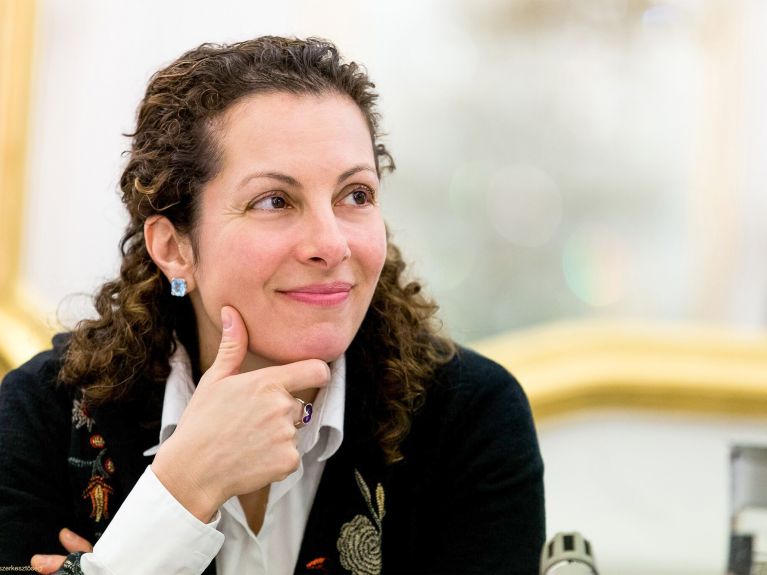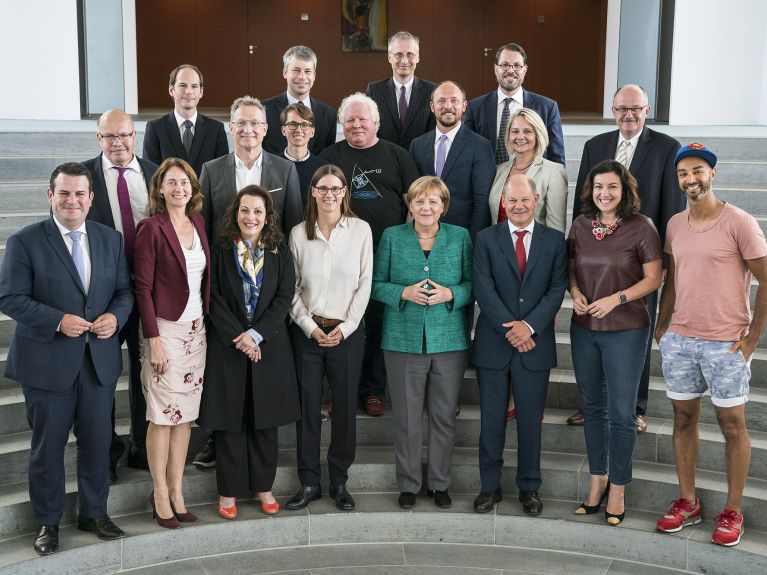“We all want our ideas to be heard”
Open Governance - the Internet enables co-governance for all people, says Beth Simone Noveck.

How can citizens be involved in governing by contributing their wishes, ideas and expertise? And how can leaders use big data to make their work more transparent and prevent corruption? Beth Simone Noveck, law professor and director of the GovLab research center in New York, advises governments worldwide on open governance – for example Barack Obama during his time in office and, since 2018, the German government. In this interview, she talks about this democracy of small steps and the chances and challenges of Germany’s Digital Council.
Professor Noveck, at the turn of the century, you were at the forefront of the so-called open government revolution. How did you get interested in this topic in the first place?
Before becoming a jurist, I did my doctorate in political sciences and German literature in Innsbruck. I became interested in what made some political institutions in Germany and Austria bend and others break, what made them either withstand or succumb to national socialism. As a first generation digital native, I later applied this question to our century and asked: How can the internet and new technology help to strengthen democracy?
Should it not be self-evident for democratic governments to ask their own citizens for advice and input? Why were they for the longest time reluctant to do that, while allowing powerful industry lobbies to fill that role?
For a long time, we have been perfecting a notion of arm's-length, independent, dispassionate bureaucracy, which relies on civil servants, who take decisions on behalf of society. This helped to get rid of the rampant corruption common in previous centuries. In the 21st century however, bureaucracy has become outdated – we live in a world in which everybody has equal access to information at their fingertips and in which expertise about problems and potential solutions is not limited to government employees but widely distributed in society. These radical changes also need to be reflected in the way we govern.

After all this time of being governed from afar, many citizens feel alienated, or even distrust their government as the rise of right-wing parties all over Europe shows. How can governments re-establish trust and convince citizens to engage?
The challenge is that open governance is still relatively new. We must find many opportunities to engage citizens – in fact, on a regular basis and not just as an occasional exercise. Over time they will understand that governments do not only ask for their advice but also implement some of it. Engineers, scientists, medical doctors and practical, smart citizens have for example responded to calls for innovations on crowdsourcing websites such as the US government’s challenge.gov. Those ordinary people with extraordinary talents can help governments find solutions that civil servants would not come up with themselves.
How can we ensure that a diverse range of citizens participates in open governance initiatives – and not only those who are already privileged?
That’s a crucial question for us. If we only invited volunteers to participate on digital platforms, we would get a highly imbalanced perspective. For example, when Estonia asked its citizens to develop proposals to reform the political system after an episode of corruption, the online participants were disproportionately male and middle-aged. Hence the government combined this with an offline exercise where they selected a jury of citizens who were representative of the Estonian population. To ensure legitimacy, we must take pains to reach out to groups who might otherwise not participate.
Are they paid for their time commitment or is this entirely pro bono – which, again, might disincentivize people who have to work several jobs to make ends meet?
Most of this engagement is not extremely time consuming, so it is not remunerated. Nonetheless, crowd-law platforms like Barcelona's consultation forum Decidim or Better Reykjavík attain very high engagement rates: On the latter, 20 percent of the city’s inhabitants actively collaborate to solve urban challenges. New technology has made it cheaper, faster and easier for real people to play an active role in public life.
I see it as a great honor to share my experience for the benefit of the public in Germany.
When the German chancellor Angela Merkel asked you to become a member of the German Digital Council, why did you accept that honorary office – on top of all your other responsibilities?
I see it as a great honor to share my experience for the benefit of the public in Germany. I am a citizen too, and we all want our ideas to be heard. Unlike other institutions that I have worked with in the past, the German government signaled its interest to not just publish a report but to directly implement many of the ideas. The fact that the country’s senior most leaders attend many of our meetings is another sign that our work is taken seriously.
What is it like to work with chancellor Merkel?
She’s impressive! I have the greatest respect for her as a leader and a visionary. And vice versa, she also affords us the utmost respect and attention. I have been in a room with many leaders – and non-leaders – who start checking their emails within 30 seconds and, while nodding politely, do not really listen. Chancellor Merkel is the opposite: She asks hard, serious questions to probe and understand the discussions we have about the role of digital technology for society and government.
How come that, while the Digital Council is committed to increasing transparency, it meets behind closed doors?
Being in favor of open governance does not mean that every meeting needs to be broadcast online. By closing the doors, we give politicians a chance to acknowledge that they are not yet familiar with everything. Opening up government is a big culture change which takes some time. Our council makes great efforts to be transparent and inclusive: When we started our work in 2018 for example, we pushed the German government to crowdsource inputs on the Artificial Intelligence policy before it was enacted. And of course, we publicly share the results of our work and regularly participate in conferences like the Internet Governance Forum.
Obama’s Open Government Initiative which you led was discontinued by the Trump administration. How transparent and collaborative is the current US government? And what can citizens do if their government does not want to let them participate?
Although open governance is not a priority for the current administration, there are still many advocates of transparency and citizen participation on the federal, state and city levels who continue their work. We do not hear much about their initiatives anymore though, because the daily news cycle takes up all the attention. My hope is that with a change of leadership, we will get back on track.
You would like to receive regular information about Germany? Subscribe here:


